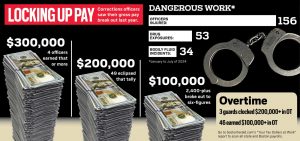
Your Money: The 60-year career: How to plan for a longer work life
Bruce Helmer and Peg Webb
For decades, the traditional career path was clear: Work for about 40 years, retire and enjoy a well-earned break in your later years.
However, with increasing life expectancy, shifting economic trends and changes in workplace dynamics, that model is evolving. More Americans are now looking at careers that span 60 years instead of the traditional 40, whether by necessity or choice.
According to U.S. Census Bureau data analyzed by LendingTree, as of March 2024, nearly a quarter of Americans aged 65 and older were still in the workforce, and that number is expected to rise in the coming decade.
Some remain employed because they need the income, while others continue working for the purpose and fulfillment it provides. Regardless of the reason, this shift in career length has major planning implications.
The financial realities of a longer career
One significant advantage of a longer career is the extended income stream. Continuing to work beyond the traditional retirement age can help extend financial independence and ease the immediate need to draw from retirement savings. This approach may be particularly beneficial in light of ongoing discussions about the long-term sustainability of Social Security. While the future of the program depends on legislative decisions, proactive financial planning can help individuals navigate potential changes with greater confidence. With a longer working life, individuals have more time to save, but they must also be prepared for fluctuations in income and career transitions.
To sustain financial well-being over a six-decade career, strategic planning is essential. Retirement savings should remain a priority, but the approach may need to be more flexible than in previous generations. Utilizing tax-advantaged accounts such as 401(k)s, IRAs and Roth IRAs allows you to continue to build a nest egg while taking advantage of tax benefits. Your contributions to these accounts should be adjusted whenever your income changes, increasing during high-earning years to create a stronger financial cushion for the future. Regularly reassessing your retirement goals is also crucial, ensuring savings align with an extended career trajectory.
Health care and insurance considerations
Health care planning is another critical factor in navigating a longer career. Affordable employer-sponsored health insurance may not always be available, making it necessary to explore private insurance or Medicare options. Long-term care insurance and Health Savings Accounts can provide additional security for future medical expenses, helping you manage escalating health care costs later in life.
Emergency funds and income diversification
Maintaining financial stability throughout an extended career also means preparing for potentially more frequent career transitions. A robust emergency fund is essential to weather periods of lower income, job changes or unexpected financial challenges. Ideally, your savings should cover six to eight months of living expenses, which is designated to provide a safety net that reduces stress and ensures financial security during periods of change.
Relying solely on a single income source may not be practical over such a long career, making diversified income streams an important consideration. Many workers are turning to consulting, freelancing and passive income investments to supplement their earnings. These additional revenue sources provide financial flexibility and can be especially beneficial for those transitioning between jobs or seeking a more balanced work-life approach.
A well-diversified investment portfolio also plays a key role in long-term financial success. By maintaining a mix of assets that balance growth with stability, workers can protect their savings while continuing to generate income as they age. Adjusting investments over time ensures they align with changing risk tolerances and financial needs.
Lifelong learning and career adaptability
Navigating an extended career also requires continuous learning and adaptability. The Stanford Center on Longevity emphasizes the importance of “longevity literacy,” which means understanding how to manage both finances and careers over a longer lifespan. Lifelong learning is key to staying relevant in an evolving job market. Investing in skill development and education can help position yourself for new opportunities and maintain your earning potential throughout different career phases.
Flexibility in work arrangements is another factor reshaping traditional career paths. More professionals are choosing phased retirement approaches, gradually reducing work hours rather than stopping work altogether. This strategy allows for continued income while easing the transition into retirement, providing financial stability without that abrupt end to the life of work.
Aligning financial planning with personal goals
A longer career also presents the opportunity to align financial planning with personal goals and passions, something that we at Wealth Enhancement emphasize with our clients. We see many redefining work on their own terms, pursuing meaningful roles that provide both financial security and personal fulfillment. This shift allows for a more purposeful career trajectory, where financial plans are designed to support not just retirement, but an entire lifetime of evolving aspirations.
The path forward
As the concept of the 60-year career becomes more common, financial planning must evolve accordingly. By embracing continuous learning, diversifying income sources and taking a strategic approach to retirement savings and health care planning, you can navigate an extended career with confidence. Consulting with a financial adviser can help tailor these strategies to your individual circumstances, ensuring that a longer working life remains an opportunity rather than a challenge. Proper planning will not only support financial stability but also allow for a fulfilling and purposeful career well into the later years of your life—should that be a goal you wish to pursue.
Related Articles
Your Money: Does deregulation help or hurt investment outcomes?
Your Money: Financial planning tips for small-business owners
Your Money: Five tough questions to ask before retirement
Your Money: Protect yourself from tax scams this season
Your Money: Helping your boomerang kids without busting your budget
The opinions voiced in this material are for general information only and are not intended to provide specific advice or recommendations for any individual.
Bruce Helmer and Peg Webb are financial advisers at Wealth Enhancement Group and co-hosts of “Your Money” on WCCO 830 AM on Sunday mornings. Email Bruce and Peg at yourmoney@wealthenhancement.com. Securities offered through LPL Financial, member FINRA/SIPC. Advisory services offered through Wealth Enhancement Advisory Services, LLC, a registered investment advisor. Wealth Enhancement Group and Wealth Enhancement Advisory Services are separate entities from LPL Financial.


